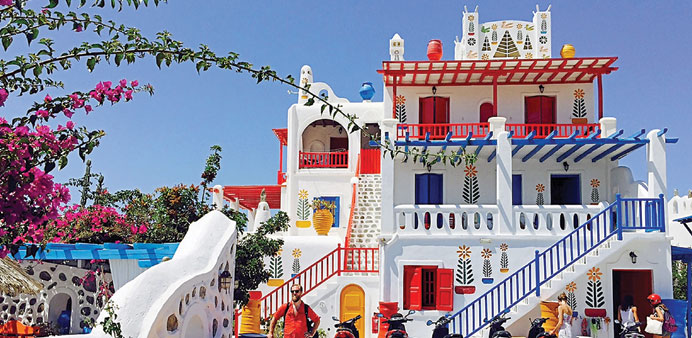By Jessica Gelt
It was a gaffe that reignited our fears about our decision to honeymoon in Greece. Like those fears, it turned out to be a classic case of much ado about nothing.
As our plane approached Athens in late July, right after a Greek exit from the Eurozone had been narrowly avoided, our in-flight entertainment systems were showing an ABC News segment about the economic crisis. The report went something like this: The country was on the brink of financial collapse. Banks were closed, citizens were standing in lines 20 deep at automated-teller machines and protesters were swarming Constitution Square.
We stared at each other in panic. We thought the crisis had ended with the latest bailout, and we hadn’t brought cash, let alone a suitcase full of euros.
The TV screens went black, and the public-address system crackled to life. “Ladies and gentlemen, I do apologize,” came the soothing voice of a flight attendant. “It appears we were playing an old version of the news.”
Sighs of relief and nervous laughter filled the aircraft.
And that was the only effect the Greek economic crisis had on a nine-day vacation that included three days in Athens and visits to the islands of Syros, Paros, Mykonos and Santorini.
That’s not to say that the desperation, frustration and fierce pride of the Greek people were not palpable in animated conversations in tavernas and cafes, or in the politically charged graffiti that blanketed nearly every public surface in Athens. It’s just that in many ways this was — and is — an ideal time to visit the country, especially for budget travellers.
The usual tourist herds have thinned, traditional Greek hospitality is in overdrive and prices are down for hotels and meals.
With tourism accounting for about 18 percent of the country’s gross domestic product, Greeks are eager to maintain that revenue flow, and no host wants to risk a bad TripAdvisor review.
At the four-star O&B Athens Boutique Hotel (www.oandbhotel.com) near the capital’s bustling Monastiraki neighbourhood our room cost 119 euros, or about $133 a night, and came with an extravagant buffet breakfast of sausage, eggs, yogurt, fruit and fresh-squeezed juice. Upon check-in we were escorted to our room, and shortly after a server knocked on our door with a complimentary tray of olives, nuts and cheeses.
In Santorini, which is perhaps the most vaunted and expensive of all the Greek islands, we stayed in the caldera-facing Sunset Hotel (www.sunsethotel.gr), where we had a spacious room leading to a gorgeous patio with ocean views and a cliff-side whirlpool bath for 150 euros, or about $168. When it was time to leave, our host called a driver to take us to the airport, then walked us out to the road.
The lovely port-side Aktaion Hotel (www.aktaion-hotel.gr) in Syros came with breakfast and a vase of roses delivered to our room, and cost 76 euros, or about $85. The hotel owner called scooter rental companies to find one that would accept our California driver’s licenses. She wasn’t successful, so she gave us a complete rundown of bus routes and taxi services that would get us to our desired destinations.
The kindness and courtesy extended to nearly every aspect of our journey. At Tony’s Rent-a-Car & Moto on Santorini, the owner presented us with a plate of homemade baklava when we returned our all-terrain vehicle, which cost 20 euros, or about $22, for 24 hours.
The hotel clerk at Sun of Mykonos Studios (www.sunofmykonos.gr) gave us directions to a hidden beach that locals frequent, far from the techno-pumping beaches of Paradise and Super Paradise. There we discovered a tiny taverna, shaded with grape vines, that looked over the sea. The owner handed out juice to all the waiting patrons, most of whom were enjoying the smell of fresh octopus grilling on an open fire.
Visiting a foreign country during a period of historic upheaval heightens just about every travel experience, including touring the Acropolis and imagining how this great country handled a massive financial crisis in the 6th century BC that had citizens considering selling themselves into slavery. Or sipping housemade rose water while pondering Pythagoras’ wisdom: “Everything comes round again, so nothing is completely new.”
And so it was with our journey. We spent most days exploring the islands on an ATV, stopping now and again to lounge on a picturesque beach.
Evenings were consumed by eating lengthy meals, which typically consisted of a fragrant Greek salad, garlic dip, stuffed grape leaves and tender lamb with yogurt mint sauce. The latter ritual rarely set us back more than 35 euros, or about $39, for two.
At the end of our Greek idyll we flew to Rome, where prices soared and our personal economic crisis began. — Los Angeles Times/TNS

COLOURFUL: Sun of Mykonos Studios on fashionable and expensive Mykonos Island is located inland and caters to a young, hip clientele. It’s lack of pro
